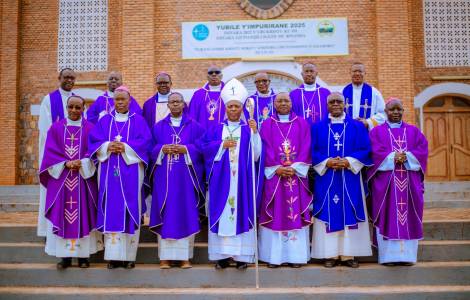
In a powerful joint statement, the bishops of Rwanda and Burundi have come together to issue a heartfelt call for peace and stability in the Great Lakes region of Africa, a region that has historically been marked by political tension, ethnic divisions, and violent conflicts. The two nations, which share a complex and often painful history, are now seeking to chart a new course towards reconciliation, unity, and peaceful coexistence.
The bishops, representing the Catholic Church in both Rwanda and Burundi, expressed deep concern over the ongoing instability that continues to plague the region. They highlighted the dire need for efforts to promote dialogue, understanding, and reconciliation among different ethnic groups, political factions, and neighboring countries. Their statement, released at a joint press conference held in Kigali, Rwanda’s capital, urged leaders from both countries to prioritize peacebuilding and avoid actions that might inflame tensions or incite violence.
In their address, the bishops emphasized the importance of addressing the root causes of conflict in the region, which include political corruption, poverty, and longstanding ethnic grievances. They underscored that peace can only be achieved through inclusive dialogue and mutual respect. “It is time for all of us, as citizens of this region, to put aside our differences and work towards building a future that is characterized by peace, justice, and prosperity for all,” said Cardinal Antoine Kambanda of Rwanda.
The bishops also spoke out about the humanitarian consequences of conflict, particularly the suffering of women and children who are often the most vulnerable in times of violence. The joint statement called for the protection of human rights, access to education, healthcare, and opportunities for economic development as essential elements of a lasting peace.
The call for peace comes at a time when both Rwanda and Burundi have faced political instability in recent years, and the specter of historical tensions—particularly surrounding the 1994 Rwandan genocide—continues to shape regional dynamics. The bishops urged both governments to engage in meaningful dialogue with civil society organizations, faith communities, and international partners in order to build trust and pave the way for a more peaceful future.
In addition to their calls for peace, the bishops also urged the international community to support the region’s efforts in fostering long-term stability. They pointed to the need for collaborative efforts from organizations such as the African Union (AU), the United Nations (UN), and regional bodies to ensure that peace initiatives are not only supported but also effectively implemented.
The joint statement has been met with widespread support from peace advocates and religious communities across the region. It is seen as a critical step in the ongoing efforts to heal the wounds of the past and build a future where people from all walks of life can coexist in harmony.
In conclusion, the bishops of Rwanda and Burundi have reminded their fellow citizens and leaders that peace is not a mere absence of war but a process that requires commitment, sacrifice, and the active involvement of all. Their collective message resonates with hope—a hope that, despite the turbulent history of the region, peace can still be achieved through dialogue, understanding, and a shared vision for a better tomorrow.
As the situation in the Great Lakes region continues to evolve, the role of religious leaders, such as the bishops of Rwanda and Burundi, in advocating for peace remains a vital and influential force in shaping the future of the region. Their united voice serves as a beacon for reconciliation and a reminder of the enduring power of faith in the pursuit of peace.

